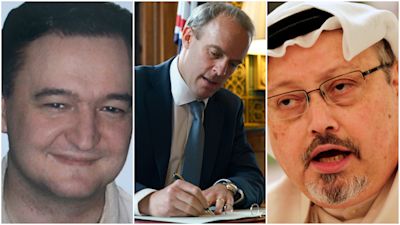Magnitsky and Khashoggi killers among 49 sanctioned human rights abusers

Video report by ITV News Political Correspondent Romilly Weeks
The UK has imposed sanctions on 49 human rights abusers, including on 20 Saudis involved in the death of Jamal Khashoggi and 25 Russian nationals involved in the mistreatment and death of lawyer Sergei Magnitsky.
The foreign secretary said the UK was seeking to “hold to account the perpetrators of the worst human rights abuses” with a "powerful" new sanctions regime set up to replace measures taken by the EU when Britain was a member.
The individuals and organisations are the first wave of designations under the new regime, with further sanctions expected in the coming months.
Others sanctioned include two high-ranking Myanmar military generals involved in the "systematic and brutal violence" against the Rohingya people and other ethnic minorities.
North Korea is also being targeted, with sanctions imposed on two organisations involved in the "forced labour, torture and murder" that takes place in secretive nation's gulags.
The new powers "will enable us to impose travel bans and asset freezes against those involved in serious human rights violations," Dominic Raab said.
The foreign secretary warned: "If you’re a kleptocrat or an organised criminal you will not be able to launder your blood money in this country."
He said the sanctions aim to send a "very clear message on behalf of the British people".
"Those with blood on their hands, the thugs of despots, the henchmen of dictators, will not be free to waltz into this country, to buy up property on the Kings Road, to do their Christmas shopping in Knightsbridge or frankly to siphon dirty money through British banks or other financial institutions."
The new powers will enable the UK to sanction those involved in the violation of human rights including; the right to life, the right not to be subjected to torture or cruel, inhumane degrading treatment or punishment and the right to be free from slavery, servitude or forced or compulsory labour.
Mr Raab said: “This is a demonstration of Global Britain’s commitment to acting as a force for good in the world.”
Britain has often moved with either the EU or UN when sanctions have been imposed in the past but is imposing its own human rights sanctions for the first time ever due to leaving the European Union.
The UK’s “autonomous sanctions” regime is set to be brought into force on Monday.
Mr Raab said: “From today, the UK will have new powers to stop those involved in serious human rights abuses and violations from entering the UK, channelling money through our banks and profiting from our economy.
“This is a clear example of how the UK will help to lead the world in standing up for human rights.
“We will not let those who seek to inflict pain and destroy the lives of innocent victims benefit from what the UK has to offer.”
'We'll protect our crown jewels': £1.57bn set out to save 'world beating' arts industry
Pret A Manger to shut 30 stores, putting 1,000 jobs at risk
The new powers are being billed as the UK's version of America's 'Magnitsky Act' which was passed in 2009 to sanction individuals allegedly involved in the death of a Russian lawyer.
Sergei Magnitsky, who worked for American-British financier Bill Browder, died in a Russian prison with injuries campaigners say were consistent with torture after accusing Russian officials of corruption.
Mr Browder, who campaigned for the US to impose sanctions on those involved, said the move by the UK was a "huge milestone" in his "10 year campaign for justice".
He told ITV News why the UK's new sanctions regime is so important.
"Every tinpot dictator wants to have a mansion in Belgravia and wants to send their kids to fancy British boring schools.
"Even though Britain is only one country of many in the world, Britain is punching way above its weight because everyone covets coming here and enjoying what this country has to offer."
Following his announcement in Parliament, the Mr Raab will meet with Sergei Magnitsky’s widow and son Natalia and Nikita, along with his friend and colleague Bill Browder, at the Foreign and Commonwealth Office.
People sanctioned in relation to his death include Russian Oleg Silchenko, an investigator "directly involved", who made six applications to extend Magnitsky’s detention period - despite his deteriorating medical condition.
Saudis sanctioned over the death of Khashoggi - a journalist who was killed in the country's Turkish embassy - include Mustafa Mohammed Al Madani.
The UK says he was "present during the unlawful killing of Jamal Khashoggi in the Saudi Consulate in Istanbul on October 2, 2018, and played an active part of the 15 man team sent to Turkey by Saudi authorities".
Mr Raab said the new powers are designed to allow individuals to be targeted "without punishing the wider people of a country that may be affected".
The Foreign Office says the new powers will allow Britain to "work independently with allies such as the US, Canada, Australia and the European Union”.
An FCO spokesperson said: “The regime will allow the UK to target individuals and organisations around the world unlike conventional geographic sanctions regime, which only target a country.
“Future targets of the regime may include those who commit unlawful killings perpetrated against journalists and media workers, or activity motivated on the grounds of religion or belief.”